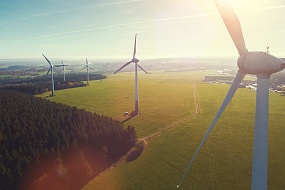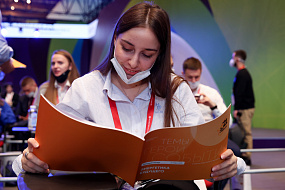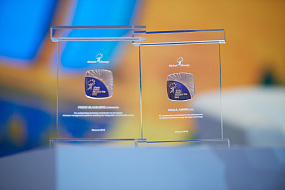Extended business programme of the Russian Energy Week is published

An extended business
programme of the Russian Energy Week with key speakers of expert
discussions has been published on the event’s official website. The International
Forum will be held on 13–15 October 2021 at the Manege Central Exhibition Hall
in Moscow. The programme covers a wide range of issues of transformation and
development in the global energy market.
“In the context of energy transition, the issues of energy development
are inextricably linked with the introduction of new technologies, and the transformation
aimed at reducing greenhouse gas emissions into the atmosphere. Climate
protection is a task that cannot be solved by one country; it is a global goal,
which can be achieved through building dialogue and cooperation between
countries. The Russian Energy Week International Forum is one of the established
platforms to discuss the future of global energy,” said Adviser to the
President of the Russian Federation Anton Kobyakov, who serves as the Executive
Secretary of the REW 2021 Organizing Committee.
A special session that will feature the Deputy Prime Minister of the
Russian Federation Alexander Novak will be dedicated to the future of
traditional energy. The participants in the discussion will answer the question
“Is the world ready to give up hydrocarbons?” In addition, during the panel session,
the participants will discuss whether oil, gas and coal are really losing
ground in the global energy sector; whether the infrastructure will have time
to readjust for new energy sources; how long will there be enough hydrocarbons
from the field projects that are being implemented; and whether an energy
transition using fossil fuels is possible.
“The fuel and energy sector has historically been an important link in
the Russian economy, accounting for up to 25% of the country’s GDP. Recently,
its role as an engine of the economy has become even more tangible for many
other countries: fluctuations in energy prices are raising issues of stable
supply, diversification of resources, as well as purity and efficiency of supplied
energy. United by the common task of setting up the system most efficiently to
continue attracting investment into the industry and creating a multiplier
effect, this year we are going to discuss strategically important issues of
monetizing the vast potential of the oil, gas and coal industries in the face
of new challenges for the global energy market,” said Alexander Novak, Deputy
Prime Minister of the Russian Federation.
The international climate agenda is forcing many countries to reform their
carbon-based energy systems. For Russia, which holds a leading position in the
global hydrocarbon markets, the transition to development with low greenhouse
gas emissions presents a serious challenge, but at the same time it opens up
new opportunities for economic growth based on renewable energy, hydrogen
technologies, advanced processing of raw materials and implementing ‘green’
projects. The track themed ‘The Climate Agenda’ included sessions dedicated to
the operation of the Russian fuel and energy sector in the context of ‘energy
transition’, the impact of the European ‘green’ pivot on the cooperation
between Russia and Europe, as well as the session titled ‘The Future of Coal in
a World Shaped by the Climate Agenda: The End, or a New Beginning?’.
Sessions of the ‘New Scenarios for the Economy and the Market’ track are dedicated
to the global challenges and opportunities of the electric power industry; the
impact of ESG on the Russian fuel and energy sector; the potential for the
renewable energy sources; and other issues of the future of energy. In the year
of its 55th anniversary, the Russian Energy Agency under the
Ministry of Energy brings together experts from key international analytical
organizations to discuss the future of the world energy during the session
titled ‘International Energy Organization Dialogue: Predicting the Development
of Energy and Global Markets’.
A track of the Forum’s business programme is dedicated to digital
transformation and ensuring the security of IT infrastructure from cyber attacks.
As part of ‘The Human Resource Potential of the Fuel and Energy Sector’
track, participating experts will discuss the prospects for developing the professional
qualification system, and a session titled ‘Bringing the Woman’s Dimension to
the Fuel and Energy Sector’ will be held.
Expert discussions as part of the ‘Upcoming Technology Solutions’ track
cover a wide range of developments in the ‘energy transition’ technology,
including in the housing and utilities sector and the transport industry. A special
session will be dedicated to cooperation between the defense industry and the
fuel and energy sector for the purpose of import substitution and technological
development.
Optimizing regulation in the energy sector and organizing the certification
and exchange of carbon credits in Russia are the basis of the ‘Regulatory
Advances in Energy’ track.
During the Russian Energy Week International Forum, the Global Energy
Prize will be awarded for outstanding research and scientific and technological
developments contributing to improved efficiency and environmental safety in
the use of the Earth’s energy sources in the interests of all humanity.
On 15 October, events will take place as part of the Youth Day of the
Russian Energy Week. It is the main event in the field of energy development,
where the best young representatives of the fuel and energy sector gather for a
dialogue with leaders and industry experts, as well as to shape the youth
agenda of the fuel and energy sector for the following year. The REW 2021 Youth
Day programme, which will bring together more than 1,000 participants from all
regions of Russia, includes events united by the idea of popularizing the
fuel and energy sector and education in engineering. Special attention will be
paid to the sector’s projects for young people, the social policy of the industry’s
leading companies, and the work of youth associations and councils.
The Russian Energy Week, as well as the REW Youth Day, are organized by
the Ministry of Energy of the Russian Federation, the Roscongress Foundation,
the Government of Moscow, as well as the Russian Society ‘Znanie’, and the ‘Nadezhnaya
Smena’ Foundation.





